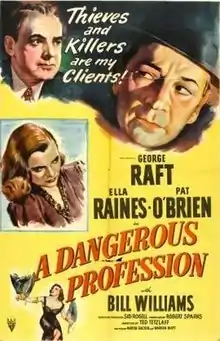A Dangerous Profession
A Dangerous Profession is a 1949 American film noir directed by Ted Tetzlaff, written by Warren Duff and Martin Rackin, and starring George Raft, Ella Raines, and Pat O'Brien.[2][3] The supporting cast features Jim Backus.
| A Dangerous Profession | |
|---|---|
 Theatrical release poster | |
| Directed by | Ted Tetzlaff |
| Written by | Warren Duff Martin Rackin |
| Produced by | Robert Sparks executive Sid Rogell |
| Starring | George Raft Ella Raines Pat O'Brien |
| Narrated by | Jim Backus |
| Cinematography | Robert De Grasse |
| Edited by | Frederic Knudtson |
| Music by | Frederick Hollander (as Frederick Hollander) |
Production company | RKO Radio Pictures |
| Distributed by | RKO Radio Pictures |
Release date |
|
Running time | 79 minutes |
| Country | United States |
| Language | English |
It was one of a series of thrillers Raft made in the late 1940s, with decreasing commercial results.[4]
Plot
The story begins as Police Lt. Nick Ferrone (Jim Backus) explains what bail bondsmen do and tells the viewers the setting is Los Angeles. One such man is Vince Kane (George Raft), a former police detective who worked with Ferrone. When one of his customers, Claude Brackett (Bill Williams), is murdered, Kane decides to investigate. He has two reasons for investigating: the curiosity of a former cop and it seems that he has fallen in love with Brackett's widow Lucy, an old flame.
Cast
- George Raft as Vince Kane
- Ella Raines as Lucy Brackett
- Pat O'Brien as Joe Farley
- Bill Williams as Claude Brackett
- Jim Backus as Police Lt. Nick Ferrone
- Roland Winters as Jerry McKay
- Betty Underwood as Elaine Storm
- Robert Gist as Roy Collins, aka Max Gibney
- David Bauer as Matthew Dawson (as David Wolfe)
Production
It was the fourth movie George Raft made for RKO following World War II, following Johnny Angel, (aka The Big Jump, and Hounded); Nocturne; and Race Street.
The film was an original script by Warren Duff and Martin Rackin called The Bail Bond Story. It was originally sought by Humphrey Bogart's company.[5] Later Fred MacMurray optioned it for his company but he allowed the option to expire.[6]
Eventually the script was bought by RKO who got George Raft to star. Raft was meant to star in The Big Steal but had been held up making Hounded, (aka The Big Jump, but released as Johnny Angel, and so was replaced by Robert Mitchum; RKO gave him this film instead.[7][8] Pat O'Brien signed to co star and filming was pushed back to enable O'Brien to appear in a stage production of What Price Glory? directed by John Ford and so that Raft could go to Europe.[9][10]
In February 1949 Howard Hughes announced that Lewis Milestone would direct and Raft would star alongside O'Brien and Jane Russell.[11] However, in the end Ted Tetzlaff directed.
Filming started in May 1949. Jean Wallace played the female lead but was fired after four days. She was replaced by Ella Raines, who was flown out from England.[12]
The film's title was changed to A Dangerous Profession in September.[13]
Reception
Pat O'Brien later called the film "a dog".[14]
Box Office
Raft's three previous films for RKO were profitable but this film recorded a loss of $280,000.[15]
Critical
The New York Times gave the film a mixed review, and wrote, "Laconic and familiarly tough are the words for Raft's performance as the torch-bearing bail bonds-man. Ella Raines is decorative if little else as the object of his affections; Pat O'Brien contributes a standard portrayal as his hard business partner; James Backus is professional as a tenacious detective lieutenant and Bill Williams is adequate in the brief role of the embezzler. A Dangerous Profession, in short, proves that the bail-bond business can be dangerous and that it also can be the basis for an exceedingly ordinary adventure."[16]
References
- "A Dangerous Profession: Detail View". American Film Institute. Retrieved May 13, 2014.
- A Dangerous Profession at IMDb.
- Everett Aaker, The Films of George Raft, McFarland & Company, 2013 p 143-144
- Vagg, Stephen (February 9, 2020). "Why Stars Stop Being Stars: George Raft". Filmink.
- HEDDA HOPPER (November 2, 1948). "Letter Forms Basis of Andrews Vehicle". Los Angeles Times. p. A6.
- "A Dangerous Profession". Turner Classic Movies.
- Schallert, Edwin (December 23, 1948). "Albert Camus' 'Plague' Purchased for Tracy; Europe Luring Fontaine". Los Angeles Times. p. 11.
- THOMAS F. BRADY (December 23, 1948). "MITCHUM IN LEAD OF 'THE BIG STEAL': RKO Moves Actor Into Role Originally Given to Raft – Bank Tightens Loans". The New York Times. p. 25.
- Schallert, Edwin (February 1, 1949). "LeRoy to Test French Tutor for 'Paris' Role; Gail Page in 'Lucasta'". Los Angeles Times. p. 17.
- THOMAS F BRADY (March 4, 1949). "PARAMOUNT PLANS 22 MOVIES IN YEAR". New York Times. ProQuest 105736115.
- "Hughes Inks Milestone". Variety. February 23, 1949. p. 6.
- THOMAS F. BRADY Special to THE (May 7, 1949). "THEDA BARA MOVIE GOES TO COLUMBIA: De Sylva's 'The Great Vampire' Will Be Distributed by Studio – 'Champion' Suit Ruling". New York Times. p. 10.
- "Of Local Origin". New York Times. September 13, 1949. p. 37.
- Aaker, Everett (2013). George Raft: The Films. McFarland. p. 143. ISBN 9780786466467.
- Richard B. Jewell, Slow Fade to Black: The Decline of RKO Radio Pictures, Uni of California, 2016
- The New York times. Film review, "A Dangerous Profession, With George Raft Playing a Bail Bondsman", December 12, 1949. Last accessed: January 18, 2008.